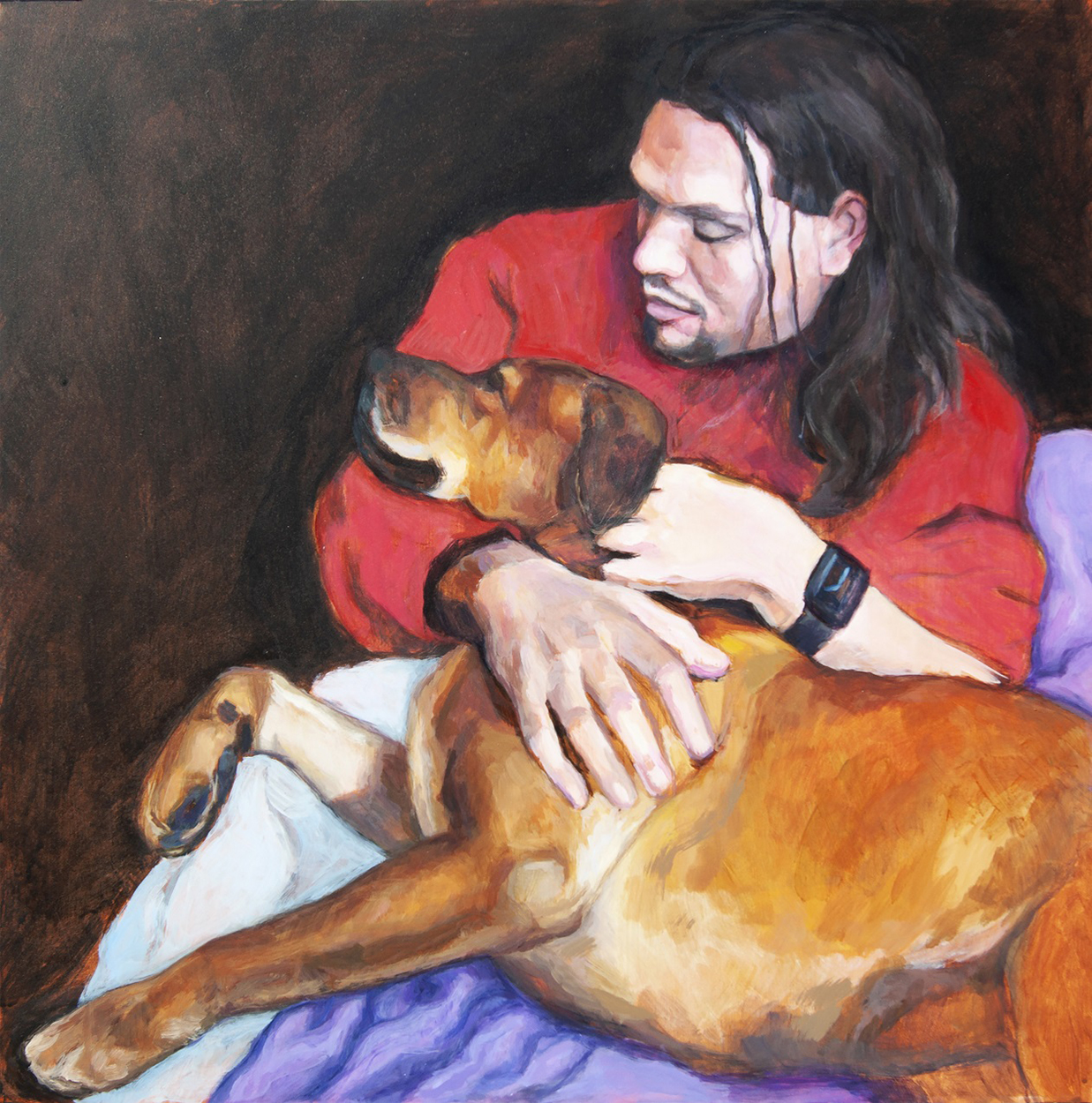Dylan and Bear
- Penobscot County Jail Storytelling Project (I)
24” x 24”, acrylic on panel and text, 2021.
Dylan’s Story
Dylan was homeless with substance use disorder before incarceration; he entered jail with a substance dependency and, like so many others in Penobscot County Jail, was held for the entirety of his 45-day stay without any treatment for his withdrawals.
Though many interviewees for the storytelling project tell of difficult experiences during booking, Dylan thankfully had an easier time than most. “The people who booked me in at PCJ were fairly good,” he explained. “It took me probably two to three hours to get upstairs.”
However, that was about the extent of the praise Dylan was able to share with regard to the troubled jail. “Out of all the county jails, PCJ is definitely the roughest time. It’s disgusting, not clean at all; if you need something it could take days to get it.”
When he asked for medical care, Dylan was treated as if he was “drug-seeking,” a stigmatizing label that is often used to deny legitimate treatment. Sadly, denials of medication for any reason or no reason at all are common inside the jail.
“[My stay in] PCJ was when I was detoxing off of opiates. They didn’t take my detox seriously and didn’t put me on any protocol. They just kind of probably assumed I was looking for meds. It took me two weeks to even see someone for mental health. When I saw the ‘med lady,’ it was a week in, and they told me my detox wasn’t bad enough, or I hadn’t been there long enough.
“I got out of PCJ I went right back to using and the same routine,” Dylan told Chelsea during his interview. “I don’t think jail is the answer to substance use. You can put people in jail, but they don’t learn anything. There’s a lot to learn when it comes to substance use in jails.”
Dylan’s top priority is for an environment which prioritizes cleanliness and human dignity. Penobscot County Jail is noted for its filthy conditions, which can feel like a visceral reminder of a deep lack of respect for those incarcerated.
“It’s really gross there. I would say the way you get treated [is the worst issue]. They treat you like an ‘Inmate,’ which they should, but you’re still human. So if you need a change of boxers, it shouldn’t take over 24 hours.”
Cleanliness was just one component of the mistreatment, however: There were much darker reminders that those inside were subject to the cruelty and disregard of those who patrolled the blocks.
“An inmate tried to hang himself and the guard ignored it and slammed the door shut. Instead of treating it like a suicide attempt, they treated him like shit, told him he’s stupid, said, ‘What the &%$! are you doing.’ Totally called him out and then put him in [segregation].”
Interview by Chelsea Putnam/Editing by Zeraph Dylan Moore.
Artist Statement
The Penobscot Jail Storytelling Project is a community-based, multidisciplinary project raising up the voices and priorities of people who have been jailed in Penobscot County, Maine. We are currently a team of 13 interviewers, transcribers, artists, organizers and advisors under the umbrella of community group No Penobscot County Jail Expansion. Learn more here.
Artist Bio
Portrait artist Lizzy Schule, a Martha’s Vineyard painter, is a part-time art teacher and full-time English as a Second Language teacher who hopes that this project will jump-start more community-based efforts to keep people out of jail.


